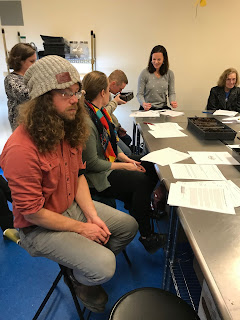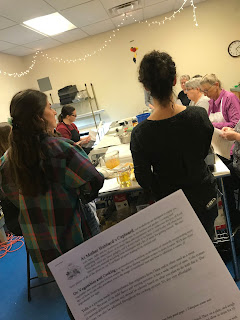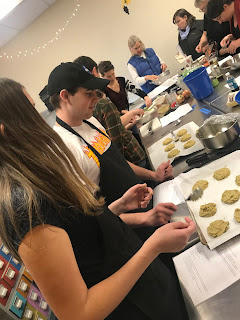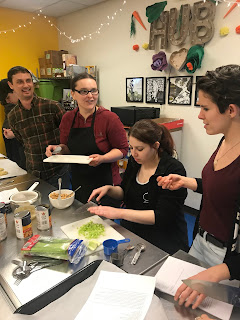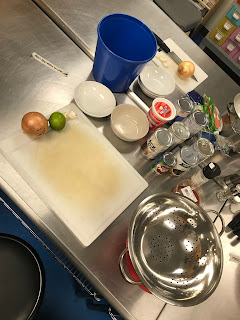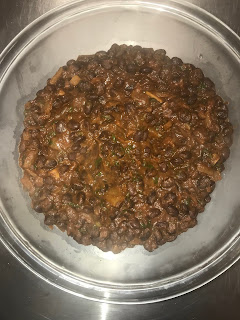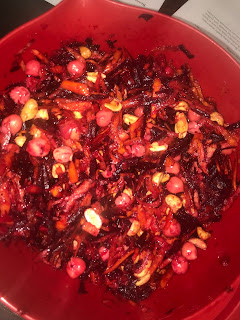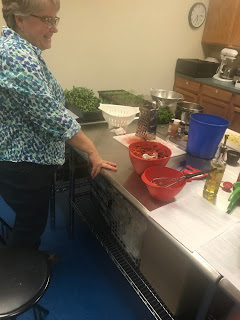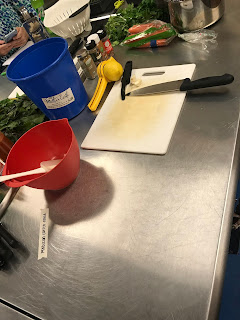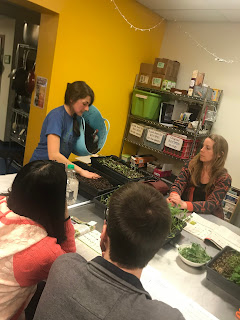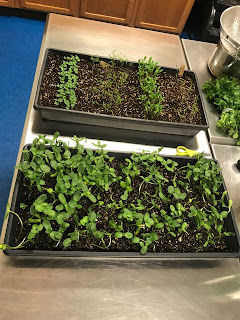For the past four election cycles, the Hub has offered voter registration to patrons & community members in an effort to help make voting more accessible for all. We know that access to food is and always has been political; programs and policies like SNAP & WIC, public charge rules, minimum wage, TANF, healthcare, housing, and more all influence people’s ability to get the food they need. We offer voter registration because we want to make sure our community has a voice in decision-making on those issues.
Though this election cycle looked very different - no chatting & checking registrations over coffee in the pantry, no helping folks fill out an absentee ballot form, no dropping off filled-out forms at Election Central - we still managed to connect with community members about the in’s and out’s of voting both before and after the election. 470 voter registration packets, 10 online voter registration help sessions, one dedicated 6-person voter registration team, 3 petitions to expand voting rights, and many conversations later, here’s what we heard from patrons and community members about their experience of registering and voting this year; what worked, what didn’t, and what changes might make a difference for next time around.
Community & Ceremony
In the general election, more community members we spoke with voted in person than by mail. While they were at the polls, folks noted that the sense of community they felt and the ceremony of voting in person were both valuable to them. Chatting with other people in line, going to vote with friends, getting assistance from poll workers, meeting candidates, getting a ride from friends to the polls, and a general feeling that people were going the extra mile to be helpful, civil, and kind to one another meant a lot. In addition to human connection, the ceremony of voting in person was important to many - things like getting their voting sticker, voting at the same polling place they always have, and recognizing their election workers.
Expanded Vote-by-Mail & General Accessibility
Several other positive notes centered on moments of increased accessibility this election cycle. While most people we spoke with voted in person, some who did vote-by-mail requested their absentee ballot online through the IndianaVoters website portal, an option that was available for the first time this year in Indiana. Along similar lines of expanding access to voting-by-mail, folks flagged that the availability of no-excuse absentee voting in the Primary was useful and appreciated, as well as Monroe County mailing out information on absentee voting to all registered voters. Patrons were dismayed that the same communication and availability wasn’t extended to the General Election.
People also noted some bright spots when it came to physical accessibility this election cycle - things like having chairs & tables to offer seated voting, poll workers checking in with senior voters about their physical needs, and allowing voters with disabilities to bypass long lines.
Suppressive Infrastructure & Rules
Sadly, alongside the positive reports, we heard about barriers that made voting difficult for community members, and in some cases, altogether impossible. We heard that patrons faced wait times at the polls varying between 10 minutes and more than 2 hours, with times being notably longer for those who chose to vote early. The long lines combined with (and likely a result of) having only one location option for early voting deterred some who were interested. One patron noted that she drove to the early voting site 5 times, and each time realized the line was too long for her to wait in. Though she was able to vote the day of the election, it’s not difficult to imagine that others with similar experiences may have been discouraged entirely. Additionally, we heard that despite the availability of free rides on Bloomington Transit during Election Day, transportation still posed an issue for patrons.
Beyond infrastructure barriers, other patrons noted that some voting rules and restrictions made voting inaccessible for them. For example, one patron told staff that due to COVID forcing job, housing, and life changes for him this year, he had failed to register by the deadline (set a month before the election) and so was unable to vote. Another patron was unable to vote because under Indiana’s rules, she did not qualify for an absentee ballot, but with two children with auto-immune conditions at home, she felt unsafe visiting the polls in person and so was forced to opt out of voting entirely. Several community members also voiced concerns about the US’s continued use of the Electoral College, and that they would prefer to see that system dismantled.
Information Gap
Other barriers stemmed from lack of information or confusion on voting rules and procedures. In a
year when uncertainty has plagued many (if not all) aspects of life, voting was no different. Patrons reported being unsure about whether there was free transportation to the polls, facing difficulty finding information about candidates, uncertainty about whether early voting was bound by the same rules as absentee voting, and general anxiety about what the polls would be like with regards to COVID-19.
Perennial Problems
And lastly, folks experienced impediments to voting in many ways that felt familiar to past elections. As with past years, we heard that making a voting plan that accommodated work schedules was hard. That folks were anxious about whether they'd been purged from the voting rolls. We heard that there was dismay with the tone of politics, a feeling that the candidates didn’t represent voters, and concerns about the use of corporate money in politics. And that people were concerned about not only their own ability to vote, but their friends, family, and neighbors’ too; people reported concerns about the disenfranchisement of incarcerated people, concerns about how rural voters would get to the polls, or whether polling places were really accessible for community members with disabilities.
Recommendations For Future Elections
Given all that we heard this year, we would offer the following recommendations for future elections. Some call State legislators and elected officials to take action, others are focused on the Federal level, and still others are geared towards what we can do as individuals and a community.
Interpersonal
- Normalize and engage in conversations with friends, family, and neighbors about voting plans
- Urge elected officials to expand voting rights and infrastructure immediately, to improve the next election cycle
Community
- Strengthen community norms around voting, and support intersectional local efforts to offer voter registration, clear information about elections, and help getting to the polls
- Build new community narratives that help increase the ‘ceremony’ of early voting and absentee voting as much as voting day-of
- Ensure that polling places are physically and logistically designed & set up with inclusivity, accessibility, and equity in mind
- Continue and expand the investment of County resources towards outreach to all registered voters in advance of every election
- Invest more heavily in early voting infrastructure
- In the absence of state or federal action to make Election Day a holiday, conduct community-wide outreach to workplaces, urging them to provide paid time off for employees to go vote
State
- Expand the availability of no excuse vote-by-mail to all Hoosiers permanently
- Strengthen civics education in Indiana schools
- Change regulations to allow voter registration up to and on Election Day, as well as exploring options for automatic voter registration
- Restore voting rights for incarcerated Hoosiers
- In the absence of federal action to make Election Day a holiday, name election day a statewide civic holiday, and create state legislation requiring employers to ensure paid time off work for employees to go vote
Federal
- Establish Election Day as a national holiday
- Pass Federal legislation requiring all states to restore voting rights to incarcerated individuals
- Provide Federal funding to help states implement strong voting infrastructure with an emphasis on equity and accessibility
- Engage in nationwide narrative building that frames voting as as a right guaranteed to all, and an opportunity to build collective power












